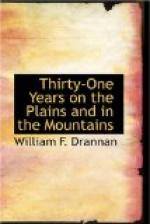When I rode up to camp and the negro cook saw that head of horns he exclaimed: “Hello, Marstah; what you got dar? You must hab killed de debbil dis time, suah.”
From the negro I learned that the officers had all been out, and had seen more or less deer and had done more or less shooting, but had only killed one small doe.
That night the elk fever raged high in camp, as that pair of horns had set them all wild to go elk hunting the next day. That night we ordered an early breakfast, so as to get an early start to our hunting ground.
After riding up the river the next morning, to where I had killed the elk the day before, we all dismounted and tied our horses. I asked them which they preferred, to go single or two together, and they thought it the best plan to go in couples.
Being somewhat acquainted with this kind of game, and knowing where to find them at this time of day, I told them what ridges to take to lead them to the main divide, also what our signals would be to come together.
Capt. Mills and I took up the center ridge, the two other couples going on ridges each side of us, but not in sight. After going about a mile or so we heard two gunshots to our left, and in a few moments we could hear elk running. The underbrush was so thick that it was difficult to get a shot at them on the run, so, seeing an opening that they were sure to cross, provided that they did not change their course, I had the Captain to stand by the side of a big tree and level his gun at the opening, and when an elk darkened the sight to fire, which he did, and got a fine elk. I fired also, but did not get my elk. He was as proud over killing that elk as I was over killing my first buffalo.
We hunted until about four o’clock that afternoon, and several shots were fired, but the Captain was the only one who got an elk that day. So we loaded that one, and the one I had killed the day previous, on to our horses and returned to camp with about all the meat the horses were able to carry.
The next morning I told the other men that as they now knew the elk range and how to hunt them, and could get along without me as well as not, that I would hunt for a grizzly bear, and if I could only kill a grizzly I would be ready to go home. I spent the next three days bear hunting, and saw any amount of sign, but only saw one bear and did not get a shot at it.
After being out about two weeks, and all having enough of hunting, they thought, to last them a year—as they had killed more or less deer, and one of them had killed an elk—and time being about up for the tug to come after us, we pulled up camp and started for the bay, arriving there on the 19th. The tug arrived on the 20th, about noon.
We reached San Francisco that evening, about dark, unloaded our baggage and meat, hired a man to watch it that night and we saddled up and rode out to the Fort.
The following morning I returned to the city, hired a team and took our baggage, as well as the meat we had killed, back to the Fort.




